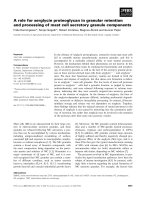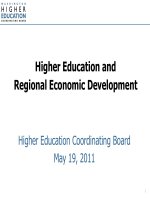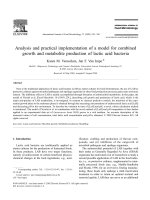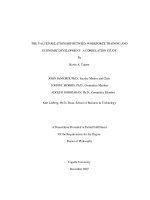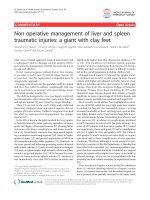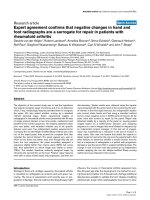Management through decentralisation and local economic development: A condition for sustainable urbanisation in Africa
Bạn đang xem bản rút gọn của tài liệu. Xem và tải ngay bản đầy đủ của tài liệu tại đây (482.29 KB, 6 trang )
Risk governance & control: financial markets & institutions / Volume 7, Issue 1, Winter 2017
MANAGEMENT THROUGH DECENTRALISATION
AND LOCAL ECONOMIC DEVELOPMENT:
A CONDITION FOR SUSTAINABLE
URBANISATION IN AFRICA
Emmanuel Innocents Edoun*
* The University of Johannesburg, Johannesburg, South Africa
Abstract
This paper is based on the premise that, urbanisation could be effective only if decentralisation
policy is at the centre of development initiatives. In this way the paper argues, local authorities
could utilize local resources to ignite local economic development (LED) through for instance
trade activities and investments.LED initiatives aim at empowering local stakeholders to utilise
business enterprises, labour, capital and other local resources effectively to maximise local
benefits in order to contribute to poverty reduction and the uplifting of citizens life conditions.
The paper is divided into four major parts. The first part gives a background of the notion of
decentralisation, urbanisation and local economic development. The second part provides an
overview of the review of the related literature while the third part gives an account on how the
above are inter-related. The fourth part provides the challenges faced by urbanisation in
achieving local economic development and part five is presented as conclusion and
recommendations.
Keywords: Developing Countries, Marshall Plan, World War II, Africa, Decentralisation, Urbanisation,
Local Economic Development, Corruption, Good Governance, UCLG
JEL Classification: D73, G3
DOI: 10.22495/rgcv7i1art3
Acknowledgement
This article was initially presented in a conference in Tetouan Morocco in November 2015. Part of it is also an
extract from my PhD thesis. It was improved for submission and consideration in your journal
economic and political power. Organisations such as
the United City of Local Government (UCLG) based in
Spain and its related organs across the world have
encouraged cities of countries members to develop
through
decentralisation
strategies
since
decentralisation is perceived in the current context
as a condition to sustainable urbanisation and local
economic development. This paper is therefore
based on the premise that, urbanisation could be
effective only if decentralisation policy is at the
centre of development initiatives. In this way the
paper argues, local authorities could utilize local
resources to ignite local economic development
(LED) through for instance trade activities and
investments.LED initiatives aim at empowering local
stakeholders to utilise business enterprises, labour,
capital and other local resources effectively to
maximise local benefits in order to contribute to
poverty reduction and the uplifting of citizens life
conditions. The paper is divided into four major
parts.
1. INTRODUCTION
Many developing countries including those in Africa
thrive to provide decent public services to their
citizens; this includes the provision of basic services
such as water and electricity. However, the initial
findings revealed that, lack of capacity, adequate
leadership; corruption and good governance are
some of the reasons why these countries failed to
achieve their development objective, especially in
most African countries. Western countries after the
World War II (WWII) put in place the Marshall Plan to
assist countries in Europe that were seriously
damaged by the atrocities of the War. The Marshall
Plan was a whole developmental package for
reconstruction and development strategy; this
included the rebuilding of infrastructures, schools,
hospitals and the entire reorganisation of state
apparatus. From there on many international
organisations were created to entrench and
consolidate the notion of democracy in most of
these European countries. The notion of democracy
and good governance therefore became the flagship
for administration in Europe. Since then nation
building and societal cohesion initiatives have assist
local, provincial and national governments to adopt
policies that use national resources effectively for
continually building Europe in order to maintain its
2. REVIEW OF LITERATURE
This paper argues that, urbanisation could be
effective only if decentralisation policy is at the
centre of development initiatives. In this way the
paper argues that, local authorities could utilize
26
Risk governance & control: financial markets & institutions / Volume 7, Issue 1, Winter 2017
local resources to ignite local economic development
(LED) through for instance trade activities and
investments. Dawking (2003) argued that, the result
of free trade among regions actually reinforce the
process of cumulative causation where growth is
catalysed in the more developed regions. For
instance, according to Cumulative Causation Theory
(Myrdal, 1957), some markets and places or nodes
attract capital and skilled labour force accumulating
competitive advantages compared to other locations.
The theory argues that, less developed localities can
have advantages from growth in developing areas
due to spread effect that derived from diffusion of
innovations in lagging areas and rise in export
markets for products from these lagging areas.
However,
the argument from
Dawking
experience is that that, free trade usually generate
economic growth at local level, helping lagging areas
to develop overtime, which in turn may trigger local
economic development. Dawking further contended
that, the implementation of decentralisation policy
may liberalise the economy and open it to
international trade, to agreement between local and
foreign municipalities. He argues that, foreign direct
investment (FDI) may have direct impact locally, due
to technology transfer. Even though, the study is not
concern about export activities, this article
recognises
that,
trade
activities
within
a
decentralised area can have positive impact on local
economic development.
LED initiatives aim at empowering local
stakeholders to utilise business enterprises, labour,
capital and other local resources effectively to
maximise local benefits in order to contribute to
poverty reduction and the uplifting of citizens life
conditions. With the above in mind, Edoun ( 2012)
argues that , decentralisation should be assessed
within the context in which it is defined if it is to be
used as an instrument for local economic
development leading to sustainable urbanisation.
Hussein,
(2004)
argues
that,
an
effective
understanding
of
the
context
in
which
decentralisation initiatives are undertaken is
important, so too are their forms and their major
outcomes. This is critical as decentralisation may
contribute to local economic development (LED).
Many forms of decentralisation may be useful for
LED.
Decentralisation
may
be
political,
administrative and fiscal. Political decentralisation,
as described by Work (2002) and Lauglo (1995),
refers to the devolution of political power and
authority to sub-national levels of government,
usually by election. However, when there is transfer
by law and other formal actions, of responsibility,
resources, and accountability, this is viewed as
devolution (Smith, 1985); (Adamolekun, 1999).
Furthermore, devolution, as defined by Dyer and
Rose (2005), refers to the power formally held at
sub-national level, where local decision makers do
not need to seek higher level approval for their
action. According to Work (2002) and Lauglo (1995),
administrative decentralisation refers to the transfer
of decision making authority, resources and
responsibilities for the delivery of selected number
of public services from central government to other
levels of government agencies.
Oluwu (2004) argues that, according to
conventional definitions, when responsibility or
authority is transferred, but not resources or local
accountability, this is referred to as deconcentration. Equally, Dyer and Rose (2005:)
describe de-concentration and delegation of
authority, as involving the shifting of management
responsibilities from the center to the lower level,
but the center still retains the overall control of
powers.
When
responsibility,
authority
and
resources are transferred, but accountability still
resides in the centre, there is delegation. This is
equally confirm by Dyer and Rose (2005) who argue
that delegation involves leaving a degree of decision
making to the lower level but the delegated system
still rests on the central authority where the power
can be withdrawn.
However
this
article
argues
that,
decentralisation policy has become increasingly
apparent in facilitating local economic development.
It considers decentralisation as a condition to local
economic development. To ascertain the above
statement, this study examines the impact that
decentralisation has had locally and at international
levels in terms of urbanisation. This article argues
that if decentralisation has succeeded to stimulate
LED in other countries and facilitate urbanisation,
the same could be possible in Africa. Therefore, a
number of recent studies have explored the impact
of decentralisation in various countries.
Hussein (2004) found that decentralisation had
a positive impact on targeting social assistance in
Malawi. Christopher Polllit (2007) similarly using the
new public management approach found that,
decentralised
management
advanced
poverty
alleviation goals in Europe. The same results were
confirmed by Reddy (1996) for South Africa. Habibi
et al (2001) studied the impact of devolution on
social sector outcomes in Argentina for the period
1970-94 and concluded that fiscal decentralisation
had a positive impact on delivery of education and
health services as well as reducing intra-regional
disparities.
The above studies are therefore of the view
that, decentralisation is an important element for
local economic development which is why this
article considers decentralisation as a condition to
LED. However, the article argues that, the state
should put in place democratic instruments for a
better implementation of decentralisation policy.
Decentralisation is a process that takes into
account the transfer of authority and power to plan,
make decisions and manage resources, from higher
to lower levels of government, in order to facilitate
efficient and effective service delivery (Smith 1985).
However, the major form of political and
administrative decentralisation that has been
adopted by most developing countries is devolution.
Eyoh and Stren (2006), argued that, political and
administrative decentralisation is important for the
promotion of local development. According to them,
decentralisation has operated at many different
levels and in different ways in particular local
contextual situations. The involvement of citizens in
development planning and implementation enables
the formulation of realistic plans that are in line
with
local
circumstances
and
conditions.
Administratively, Decentralisation is considered as a
key strategy that provides solutions to overloaded
and over-centralised agencies (Olowu 1994; Pillay
2009).
Pillay (2009) argues that, to allocate greater
27
Risk governance & control: financial markets & institutions / Volume 7, Issue 1, Winter 2017
powers to local government would signal a
corresponding diminution of provincial government.
This dilemma also plays itself out in the case of
particular service delivery, for example, in the case
of primarily healthcare provision in South Africa.
UNDP (1999) argued that, the responsibility for
primary health care (largely pre-emptive and
diagnostic services provides at clinics) is being
devolved from regional to local authorities, often at
the insistence of the regional authorities, as the local
authorities are better able to manage these services.
Although
a
wide
range
of
political,
administrative and socio-economic merits are
attributed to decentralisation and participatory
approaches, a number of scholars have raised
criticisms relating to their technical, theoretical and
conceptual limitations (Cook and Kothari 2001;
Smith
1985).
Smith
(1985)
states
that
decentralisation appears to be parochial and
separatist as it threatens the unity of the general
will, reinforces narrow sectional interests especially
and encourages development inequalities, among
others, due to its emphasis on local autonomy.
There are a number of critiques relating to the
quality, validity, ethics and operations of
participatory approaches. These approaches to
development are methodologically considered to be
parochial (Cook and Kothari 2001). For instance, the
current study argues that participatory strategies
generate poor standards and practice and lead to the
abuse or exploitation of the people involved.
Lemarchand (1998) argues that despite claims
that participatory approaches to local development
improve efficiency and effectiveness, and promote
processes of democratisation and empowerment;
there is little evidence about the effectiveness of
participation in ensuring sustainable development
and material improvement among poor and
marginalised people.
There is debate over a number of issues
including the use terminology like ‘community
participation’, the objective of participation as to
whether it is a means or an end, and the applicability
and the appropriateness of the techniques and tools
(Cook and Kothari 2001). For instance, it is argued
that the term ‘community’ masks power relations,
biases in interests and needs based on ethnicity, age
and class. It is also suggested that, in practice,
participatory approaches simply mask continued
centralisation in the name of decentralisation.
He inferred that, poor services may reduce
attractiveness of a place for external investors and
raise costs for the ones operating from there. For
instance road maintenance or the lack of it; Orderly
territorial development, through physical and land
use planning and development control reduces
uncertainties for investments by households and
firms and potential social conflict about negative
externalities by virtue of their public interest role,
Local Governments have a ‘capacity to convene’
other social actors to define the local public interest
and the broad direction of local economic
development; lastly, Local Governments can enable
or facilitate other actors to make a more effective
contribution towards solving LED problems.
Devolution, by giving local institutions the
power to make some decisions without consulting
authorities at the centre, bureaucracy is minimised
and decisions become flexible and adjusted to
respond to situations at hand. In this context,
decentralisation is viewed as an approach to
facilitate the even distribution of resources and
minimising the development of regional inequalities
(Oyugi 2000 , L’Oeil 1989). For instance, as local
economic intervention, the decentralisation process
entails establishing or decentralising small-scale
projects close to the grassroots (Nicholas, 2007).
Furthermore, Oyono (2004) argued that, local
economic development can only take place when
power is decentralised, giving local authorities the
platform to exercise their power without any
manipulation from the national government.
However Cheka (2007) argues that, if national
government influences decisions at local level, local
economic development may suffer some setbacks.
For example in Cameroon, the Government
Delegates are appointed by the State. These
Government
Delegates
are
in
charge
of
implementing some key projects at local levels and
reporting directly to the central government
(Ministry
of
Territorial
Administration
and
decentralisation,
2004).
Clearly
then
for
transparency sake local governments should be
involved in implementing these projects at local
levels rather than government delegates
This article then argues that, decentralisation
and local economic development are a condition for
sustainable urbanisation. The equation related to
this argument holds that: U= f(D)+ f(LED), this
means that, in the current context urbanisation (U) is
function to decentralisation (D) and local economic
development (LED). The argument to support the
above statement is that, the current study is of the
view that, devolution of power should be a useful
approach to stimulate local economic development
since power is transferred by law, so too are the
resources and accountability. With devolution
triggering local economic development, local
authorities are able to collect revenues from tax.
These revenues if well managed are ought to be
injected in projects such as infrastructures to
support the urbanisation strategy and processes.
The investments on infrastructures by local
authorities in return will attract foreign direct
investments. These foreign direct investments
activities on the other hand will have a
multiplication effect through job creation. Once
unemployment becomes under control through
sound macroeconomic policies, this may lead to
3. ANALYTICAL ARGUMENT ON THE LINKAGES
BETWEEN DECENTRALISATION, LOCAL ECONOMIC
DEVELOPMENT AND URBANISATION
The linkage between decentralisation and local
economic development is very significant in this
article since Local Governments who are viewed as
decentralisation agents play an important role on
LED. Edoun (2011) in quoting (Bennett & McCoshan,
1993; Helmsing, 2002c ) inferred that, the literature
on local economic development revealed that, Local
Governments play decisive role on LED initiatives.
Helmsing (2005) argued that, Local Governments
have a direct role through service delivery, which
potentially provides a source of economic
opportunity; the delivery of services may enhance or
inhibit
local
economic
development
and
competitiveness.
28
Risk governance & control: financial markets & institutions / Volume 7, Issue 1, Winter 2017
economic growth. However, the pace of the growth
should support national strategy for job creation
and poverty alleviation.
As initially stated, urbanisation may be
possible, if there is political will. All politicians
involved in development strategy of the country
should respect the rule of law. Money allocated to
projects should be free from embezzlement. This
therefore calls for the strengthening of national
institutions that should hold office bearers
accountable.
countries in sub-Saharan Africa are other factors
that are hindering urbanisation initiatives since most
of heavy equipments are purchased from overseas
with the expertise and know-how coming from the
so called developed countries. With economic crisis
forcing most of these countries to adopt some form
of structural adjustment program (SAP), the money
borrowed from international financial organisations
such as the International Monetary Funds ( IMF) and
the World Bank is usually exposed to inflation,
forcing these nations the repay the loan over a
longer period with highest rates. Sometimes of
these nations are unable to repay the loans which
automatically forces governments to abandon the
projects. That is why, in these countries, proper
infrastructures are lacking to ignite socio-economic
development.
4. CHALLENGES FACED BY URBANISATION IN
AFRICA
The current article has identified a number of
challenges that might hinder the urbanisation
strategy and processes. These are political, economic
and lack of capacity.
Lack of Capacity
The lack of capacity during the implementation
phase in most of the projects is often the reason of
poor service delivery. For instance some of the roads
built are of poor quality and
are not always
maintained during their life span. This automatically
let one to start questioning the tendering processes
related to service delivery in public sector. Initial
findings however revealed that, the tendering
process in most African public sector is a major
problem. The commissions in charge of selecting
individuals or companies that are supposed to
implement the projects, most of the time lack the
required capacities and expertise, so too are the
selected companies and individuals. But these
companies or individuals are given the projects in
the basis that, they are part of the political elite of
the ruling party. These corrupt activities obviously
are the contributing factor for poor service delivery.
This situation automatically raises the problem of
corruption that is a major impediment in Africa’s
development. Corruption has huge consequences on
Africa capacity to become self-sustainable because
of lack of transparency and accountability which are
credible instruments that help in measuring success
for instance in local economic development.
Political Challenges
Most African Nations became independent in the
sixties. Some of these countries inherited some
forms of administrations that were not appropriate
with the realities on the ground. In the early stage of
their rules African leaders who became head of
states after independence, ruled with an iron fist,
crushing any opposing forces rising up or trying to
criticize the ruling government. This was
totalitarism where transparency and accountability
were not part of the game. These repressive forces,
forced many intellectuals to flee their native
countries for greener pasture. The majority of these
nations inherited weak economies and this situation
continually led them to become more dependent visa-vis developed Nations. While natural resources
from colonies help to the strengthening of
developed economies, Africa benefited less from the
trade. It was therefore clear that, urbanisation
strategies aren’t going to succeed, since much power
was still vested to the colonial master who has
economic power. Political elites were created to seek
support from the colonial master. With the above in
mind, many illegal trade agreements were signed
between these elites and the colonial master. Local
resources were therefore sold without taking into
account, the future of generations to come. This
obviously has been a bottleneck for any world class
urbanisation in African cities. With the wind of
democracy that blew in the 1990’s, many African
governments, civil society organisations and political
parties took active part in shaping the history. As a
result, multiparty regimes were accepted in
countries were governments in office resisted them
in the past. Since then many countries have held
some forms of democratic elections were the results
were fiercely contested by the opposition. With
appropriate monitoring and evaluation systems
lacking, funds allocated to national projects were
wrongly utilised by greedy office bearers.
5. CONCLUSION AND RECOMMENDATIONS
This study argues that, devolution which is the total
transfer of powers (political and financial) from the
upper to the lower of government advocates that, by
giving local authorities the power to make decisions
without consulting authorities at the centre,
bureaucracy is minimised and decisions become
flexible and adjusted to respond to the economic
challenges at local and regional level. The study
further argued that, without addressing these
challenges, urbanisation could not be sustained
because of other challenges that may arise related to
lack of transparency and accountability as well as
corruption that is a major impediment to socio
economic development.
This article has therefore provided a robust
argument on the impact of decentralisation and
local economic if urbanisation is to be sustained
over time. The theory that informs this article
(causational theory) is based on the premise that,
trade liberalisation activities could fuel LED through
innovation or diffusion from developed to lagging
Economic Challenges
With African countries not being able to benefit
from trade, it is obvious that, many of these nations
are heavily relying on donor supports which are
conditioned
and
subjected
to
political
manipulations. The weak currencies in most
29
Risk governance & control: financial markets & institutions / Volume 7, Issue 1, Winter 2017
7.
areas. This trade liberalisation is ought to have a
positive impact on economic growth and to the
development of countries as well as of a region in
making for economic integration. Edoun (2011, 2012
and 2015) convincingly explained that, local
economic development facilitates the creation of
industries that are later involved in trade activities.
The
Myrdal
causation
theory,
convincingly
demonstrated that, local activities contribute in
expanding trade in other parts of the country until it
is able to start trading with other countries at
regional or continental levels . With globalisation
affecting the whole commercial sector, there is no
doubt that, through international trade and
multinational marketing, Local Governments who
are decentralisation agents are forced to maintain
and create new infrastructures that will facilitate the
movement of good and people. As regions are
expanding, there will be a need to create new
schools, houses, universities, hospital, shopping
centres and other related businesses. Management
through decentralisation that is the shifting of
power from upper to the lower level of government
becomes effective if it contributes to local economic
development.
However, the article is rather cautious and maintains
that,
urbanisation
is
only
possible,
if
decentralisation policy is taken into consideration.
The urbanisation of a region becomes sustainable if
local
economic
development
contributes
to
economic growth in a sustainable manner and this
as a result will contribute to the expansion of the
region through business activities and government
political will to create and upgrade existing
infrastructures
From the arguments raised in the current
article, the proposed recommendations selected and
useful for the urbanisation of Africa should:
Consider decentralisation as a condition for
suitable urbanisation
Consider good governance on the local level as
an institutional system for managing local
public affairs.
Consider mechanisms such as Monitoring and
Evaluation in order to track development
projects as they are implemented.
Consider capacity building as a solution to feel
skill gaps
8.
9.
10.
11.
12.
13.
14.
15.
16.
17.
18.
19.
20.
21.
22.
REFERENCES:
1.
2.
3.
4.
5.
6.
Adamolekun.
(1999).
“Decentralisation,
Sub
national Governments and Intergovernmental
Relations.” In L. Adamolekun, ed., Public
Administration in Africa: Main issues and country
studies. Boulder, CO: Westview Press, pp.49-67.
Bennett, R.J. and A. McCoshan (1993) Enterprise
and human resource development. Local capacity
building, London: Paul Chapman.
Cheka (2007).
The State of the Process of
Decentralisation in Cameroon. Volume 32.
CODESRIA. Dakar Senegal.
Cooke,B and Kothari,U (2001). The case for
participation as tyranny? London 2ed, Books 1-16
Christopher Pollit (2007). New Public Management
in
Europe:
Adaptation
and
alternatives.
Basingstoke, Palgrave/Macmillan.
Christopher Pollit and Geert Bouckaert (2009).
Continuity and Change in public policy making
and management.
23.
24.
25.
26.
27.
28.
30
Dawking,C.J.
(2003).
Regional
Development
Theory: Conceptual Foundations, Classic Works
and Recent Developments, Journal of Planning, Vol
18, No
Dyer, C., & Rose, P. (2005). Decentralisation for
Educational
Development?
Aneditorial
introduction. Compare; 35(2)
Edoun,E.I: (2011). PhD thesis, the University of the
Witwatersrand, Johannesburg- South Africa
Edoun, E.I (2012): Decentralisation and Local
Economic Development- Pillars of strength for
Africa’s renewal- The International Jornal for
Africa Renaissance Studies V7(1).
Eyoh,D. and Stren, R. (2006). Decentralisation and
the Politics of Urban Development in West Africa.
Wooldrow Wilson International Center for
Scholars. Washington, D.C.
Glafad (2009). The Global Action for Africa’s
Development. www.glafad.org
Habibi et al.( 2001).
“Decentralisation
in
Argentina,” Economic Growth Center, Yale
University, Discussion.
Helmsing, A.H.J ( 2005) Governance of Local
Economic Development in Sub-Saharan Africa:
who are the Dancers and do they act
‘in
Concert’? Working Paper Series No. 408. The
Hague, Institute of Social Studies.
Hussein, M.K (2004). Decentralisation and
Development: The Malawi experience. (Africa
Development 24(2).
Lauglo, J. (1995). Forms of Decentralisation and
their Implications for Education.Comparative
Education. 31(1)
Lemarchand, R., (1998) . ‘La face cachée de la
décentralisation: réseaux, clientèles et capital
social’, in Bulletin IPAD, Décentralisation, pouvoirs
sociaux et réseaux,Sociaux, No 16, LIT, p. 9-18.
L’Oeil, RP.(1989). Main issues in decentralisation,
Strengthening Local Government in Sub-Saharan
Africa. Proceedings of a workshop held in Italy, 517 March, World Bank.
Nicholas, H. (2007). Public Administration and
Public Affairs, tenth edition. Printice-Hall of India,
Private Limited, New Delhi.
Njoh,
Ambe
(2003).
Urbanization
and
Development in Sub-Saharan Africa. Cities, vol. 20
(3): 167-174.
Njoh, Ambe (1997). Colonial spatial development
policies, economic instability and urban public
transportation in Cameroon. Cities, vol. 14(3): 133143 (June).
Olowu, D 1994. Beyond the failure centralized
state in Africa. Strengthening African Local
initiatives: Self Governance, Decentralisation and
Accountability.
Oyugi, W.O. (2000). ‘Decentralisation for Good
Governance
and
Development’
Regional
Development Dialogue, Vol 21, No 1,pp3-22.
Oyono, D (2006). National Programme for
Governance.
Saint
Paul
Edition,
Yaounde
Cameroon.
Perroux, F. (1950). Economic Space: Theory and
applications. Quaterly Journal of Economic 64.
1:89-104.
Perroux,F. (1957). “ Note on the Concepts of
Growth Poles”, translated by Linda Gates and Anne
Marie McDermott, Perroux Francois, “Note sur la
Notion de Pole de croissance” Economie appliqué,
½,1955.
Pillay, P. (2009). Decentralisation and Service
delivery: The Politics of Service delivery. Wits
University Press.
Reddy,
P.
S.
(1999).
Local
government
restructuring in South Africa. Readings in Local
Risk governance & control: financial markets & institutions / Volume 7, Issue 1, Winter 2017
29.
30.
31.
government Management and Development,
Kenwyn, Juta & Co Ltd. Cape Town.
Reddy, PS. (1996). Local government restructuring
in South Africa. Readings in Local government
Management and Development, Kenwyn, Juta & Co
Ltd. Cape Town.
Smith, B.C.(1985). Decentralisation: The Territorial
Dimension of the State.London: Allen and Unwin.
The Uclga, (2004). The United Cities for local
government of Africa .www.uclga.org
32.
33.
34.
35.
31
Urban Foundation, (1994). Local Economic
Development: New Strategies and Practical
Policies. Johannesburg: Urban foundation.
UNDP, (1999). Decentralisation: a sampling of
definitions, October.UN, NY.
Van Niekerk et al (2001). Governance, politics and
policy in South Africa.Oxford University Press,
Southern Africa.
Work, R. (2002). Overview of Decentralisation
Worldwide: A Stepping Stone to Improved
Governance and Human Development.


